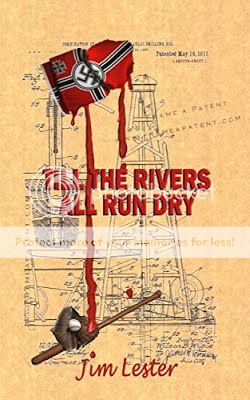Coming of Age, Historical Fiction
Date Published: July 27, 2016
In 1941, when thirteen-year-old Ricky Parker’s family is uprooted from their home in Arkansas and relocated to Venezuela, Ricky thinks his life is over. But what he finds in a rough and tumble oil camp on the banks of Lake Maracaibo is the adventure of a lifetime. An adventure filled with Nazi spies, treachery, betrayal, true love, and even murder.
While touching on issues that remain relevant today, such as racism and America’s reliance on foreign oil, this coming-of-age novel is a page turning, high-octane suspense tale of star-crossed young lovers set in exotic wartime Venezuela.
Excerpt
One Friday evening right before the Fourth of July in the summer of 1941, I answered the front door and my whole life changed.
Two men in suits stood on the porch. One of them was an older fellow, wearing a cheap brown suit and a high starched collar that was wilting from the summer heat. The band in his rumpled fedora was stained with sweat. He had a droopy mustache that was part black and part white and an Adam’s apple that looked about the size of a baseball.
The other man was younger and had on a nicer suit. He removed his hat and showed off a thick head of blond hair. His face was pasty white, and I knew right off that he’d never done a lick of farmwork in his life.
“Is Mr. Chester Parker at home? We’d like a word with him if it would be convenient.” The younger man sounded like Mr. Hunter who taught English over at El Dorado Junior High, where I had just finished the seventh grade. They both talked real educated and proper-like.
“I reckon he’s out back,” I said. “Y’all come on in and I’ll get him.” I looked past the two men on the porch and saw some angry-looking dark clouds gathering off to the east, promising a summer rain.
The two men stepped into the living room. The older man removed his hat and scratched his bald head.
Before I could fetch Daddy, Mama stepped into the living room from the kitchen. She was wearing her big red apron that was dusty with flour from making the biscuits for supper. She had a dot of flour on her nose. “Who is it, Ricky? Did you . . .” She pulled up short in the doorway and drew in a quick breath.
“Howdy, Dixie,” the older man said. “How you been?”
Mama eyed the man like a dead garden snake she’d found on the back porch. “Evening, Mr. Taggert. I reckon I’m fine.” Mama’s tone filled the living room with a chilling frost.
The older man ignored Mama’s coldness. “This here is Mr. George Quinn. He’s from Washington. We need to have a word with Mr. Ches if we might.”
I couldn’t believe what I was hearing. Washington? What on earth would some stranger from Washington, DC, want with my father?
Mama wiped her hands on her apron. “Ricky, run on out to the shed and fetch your daddy. Be quick now.”
I scampered back through the kitchen and out the screen door and sprinted across the yard to the shed. I found Daddy hunched over his worktable lost in thought, staring at the parts of a radio he had spread out in front of him.
Daddy could fix anything as long as it was mechanical. Big machines, little machines. It didn’t make any difference. My father could fix all of them.
His pipe was clinched tight in his teeth and the sticky sweet smell of his burning tobacco filled the tiny shed.
“There’s a pair of fellows in suits here to see you,” I said, a little breathless from the ru
n across the yard. “I don’t think they want you to fix anything. I think they just want to talk.”
Daddy smiled and stood up from the worktable. “Then I guess we better go in the house and see what’s going on.”
My father was a tall man, skinny as a rail as the saying went. He had black hair slicked back with Brylcreem. Some folks said he looked Italian, but that was mainly because he’d spent so much time out in the sun that his skin was all brown and leathery looking. He always wore a blue work shirt with the sleeves rolled up past his elbows even in the summer.
Daddy had been a drilling supervisor at Murphy Oil and a real good one from what everybody said, but one day back in ’39 something happened out on one of the rigs and Daddy came home, put his lunch pail on the high shelf up in the pantry and announced that he’d never work for Murphy or any oil company again. And that was that.
My father didn’t do much but hang around the house for a few weeks. He’d sit at the kitchen table and take old radios apart and put them back together. Finally other folks started bringing him their busted radios and percolators and mix masters and stuff to fix and Daddy cleared out a space in the old shed out near the chicken coop and went into the small appliance repair business.
Daddy never hurried anywhere. Even after I told him about the two visitors, he ambled across the yard as if he were just heading up to the house for a drink of water.
Back in the living room, Mama had served ice tea to the two men, who were sitting on the blue sofa when Daddy and I came in. They stood up and shook hands all around. Mama brought Daddy a glass of tea. He drained half of it in one gulp.
“It’s good to see you again, Mr. Ches,” Taggert said.
Daddy nodded. “What can I do for you?” He sounded unfriendly and I could tell my father didn’t have much truck with the Taggert fellow.
The first plunks of the summer rain hit the roof. The smell of Daddy’s tobacco overpowered the living room.
Taggert and Quinn sat back down, balancing their hats in their laps. Mama leaned on the doorsill, wiping flour off her hands with her apron.
“Mr. Ches,” Taggert said. “We need to talk some business if you have a few minutes.” Daddy shrugged.
Taggert turned and looked at me. “Son, why don’t you run outside and play for a while. This won’t take long.”
“It’s raining,” I said, indicated the front window where the summer storm was pelting the glass.
Taggert gnawed on his lower lip.
“Come on, Ricky.” Mama came to Taggert’s rescue. “Let’s you and me run out to the henhouse and fix up those stalls like we been promising to do since school let out.”
I didn’t want to leave the living room. Something was going on. Something big. You could just feel it in the air. You could see it on Daddy’s face, hear it in Mama's voice. This was important. And I had to go out and fix up the stalls in the henhouse. I was not happy.
But I went.
By the time Mama and I hammered all the loose boards back into the chicken stalls, replaced the straw, swept out the walkway, and went back to the house, Taggert and Quinn were gone.
Daddy sat in the chair in the living room, staring out the window at the rain. The drops pounded the glass and ran down the panes in fast flowing rivulets.
It was getting dark, but Daddy hadn’t turned on any lights. He just sat there in the chair, smoking his pipe and staring out the window. He didn’t even turn around when Mama and I came back into the house. He just sat and stared and smoked. I’d never seen him look like that.
“Daddy? Are you all right?” I stood in the doorway to the kitchen, fighting back that awful sense that something was bad wrong.
My father didn’t say anything. Blue smoke drifted out of his pipe and floated toward the ceiling. The room got darker and darker.
Two weeks later, he and Mama and I took a train down to New Orleans, got on a big ship, and headed for Venezuela.
About the Author

Jim Lester is the author of two previous coming of age novels-Fallout, which Booklist called " a fast paced, clever coming of age story, Salingeresque in spirit and The Great Pretender, which received consistently excellent reviews on Amazon. He is also the author of the sports history book Hoop Crazy: College Basketball in the 1950s.
Contact Links
Purchase Links



This sounds great, and it's in the Kindle Unlimited program!
ReplyDelete